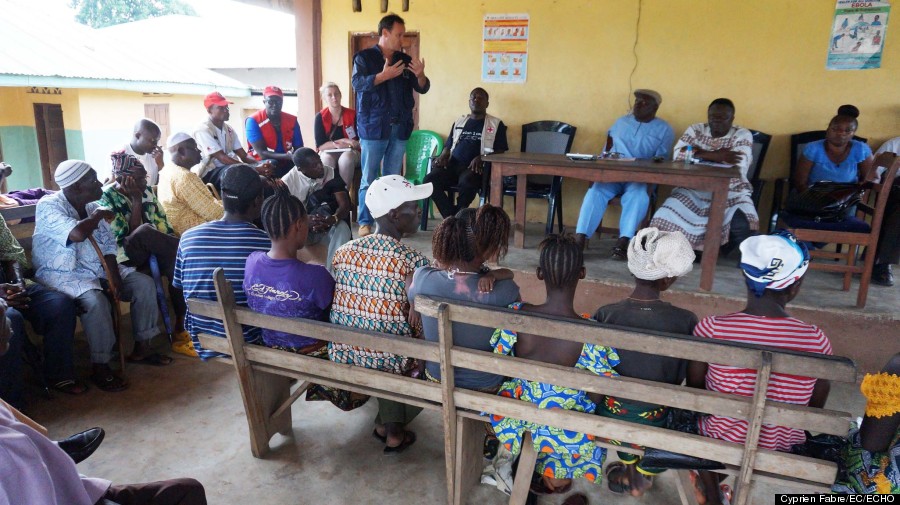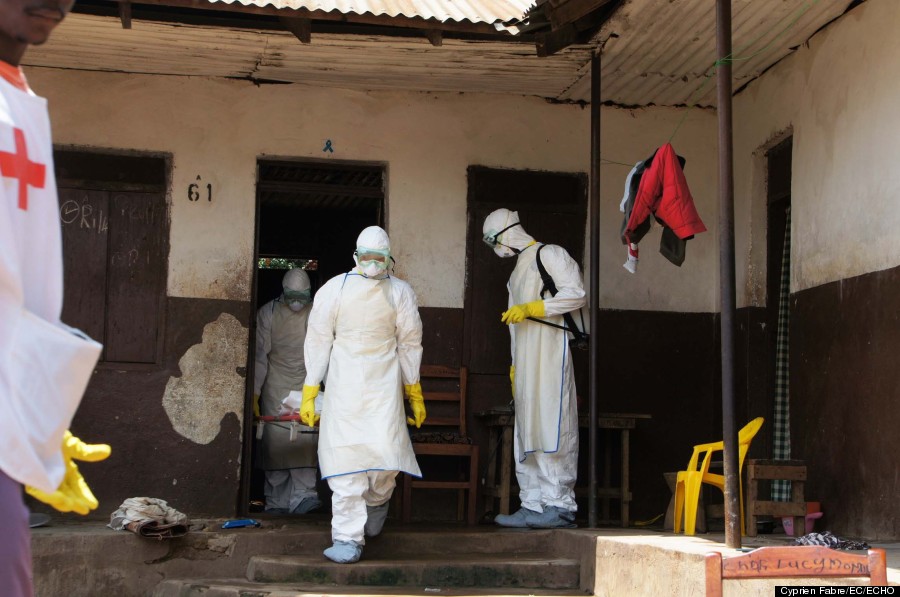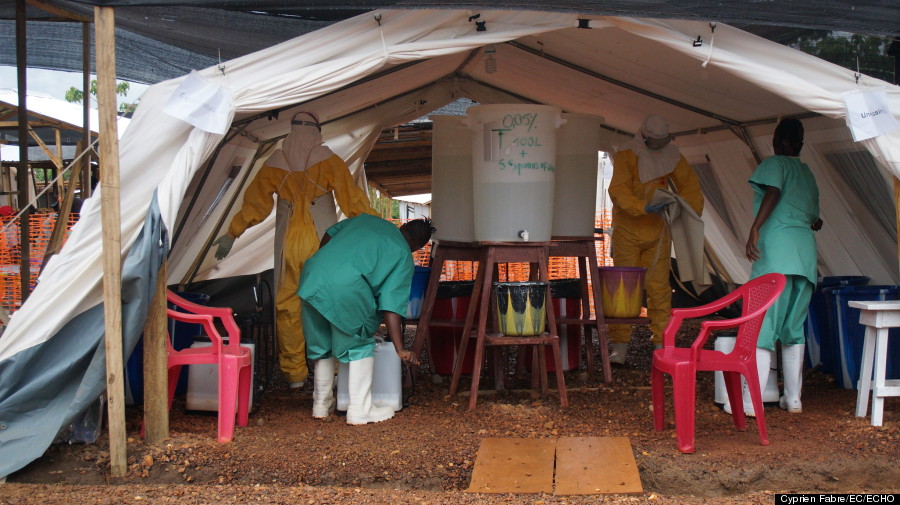Cyprien Fabre works in the Regional Support Office for West Africa of the Directorate-General for Humanitarian Aid and Civil Protection, part of the European Commission (the executive body of the European Union). He recently spent time in Kenema and Kailahun in Sierra Leone, some of the hardest-hit areas by the Ebola outbreak. He shared what he observed about the outbreak, and what people in the U.S. can do to help. For more photos from the European Commission in West Africa, visit the Flickr page here.
HuffPost: What were you doing in West Africa?
Fabre: I was in Sierra Leone [more than] three weeks ago, in the epicenter of the outbreak in Kenema and Kailahun. I'm part of the European Union, funding NGOs and the WHO [World Health Organization] and all those responders. Our goal is provide money, and also to monitor and see how [things are going], if we need more or less, or need to change how the response is going.
 We’re here in Panguma, between Kenema and Kailahun, a village that has been severely affected. We meet the Paramount chief (in the blue suit with a beret) to whom I express the European solidarity with the Sierra Leone people and what we do. On the bench in the forefront are seven Ebola survivors. They’re physically very fine but the stigma is still high within community. All of them lost several or all their family -- child, spouse -- so their life is in pieces.
We’re here in Panguma, between Kenema and Kailahun, a village that has been severely affected. We meet the Paramount chief (in the blue suit with a beret) to whom I express the European solidarity with the Sierra Leone people and what we do. On the bench in the forefront are seven Ebola survivors. They’re physically very fine but the stigma is still high within community. All of them lost several or all their family -- child, spouse -- so their life is in pieces.
I was on the monitoring mission there with the Médecins Sans Frontières (MSF, or Doctors Without Borders), who are really the first responders. So we went with them and the Red Cross as well. I was in Freetown, the capital city, and out in the field.
 We're here within the MSF treatment center in Kailahun, Sierra Leone. This is the command post area, made of several tents. On the right is where the statistics are updated. The next tent is the laboratory where samples are tested. On the left is the tent where doctors and nurses get dressed to go into the high-risk area; there's another one on their way out, where gloves and PPE are then burnt. Only the rubber boots and washable overall suits are disinfected and dried under the sun.
We're here within the MSF treatment center in Kailahun, Sierra Leone. This is the command post area, made of several tents. On the right is where the statistics are updated. The next tent is the laboratory where samples are tested. On the left is the tent where doctors and nurses get dressed to go into the high-risk area; there's another one on their way out, where gloves and PPE are then burnt. Only the rubber boots and washable overall suits are disinfected and dried under the sun.
Can you paint us a picture of what the situation is like in Sierra Leone?
The epidemic is growing. It's completely out of control. Sierra Leone is really not good. There was a lot of difficulty to respond to that because there's not a sufficient health structure. There are people who cannot access the health centers, who are afraid of getting there, who are refusing, there's a lot of denial. So it's complicated.
It reminded me of a conflict zone. The atmosphere is really heavy. No one touches each other. Everybody is afraid. You just talk about that all day and all night. If somebody died [and you have to retrieve the body], you have to go and wear the full protective equipment, and it could be in a village in the middle of a deep forest. People might look at you with that strange look, a bit of fear. It's difficult to capture, but you can feel that when you are within the health compound, or the health center.
 Pictured here is a body removal in the community. The Red Cross volunteers first came in the house and sprayed chlorine throughout the house. This alone takes at least one hour, if done correctly. Then another team comes with the hand barrow, puts the body in a sealed white body bag and removes it from the house for burial. Later in the evening, we’ll find the test is negative. The child died from something else besides Ebola. But unless you know before, the full protocol has to be applied to anyone. At the scale of a country, this require a lot of staff, a massive logistic and a solid Personal Protective Equipment supply chain.
Pictured here is a body removal in the community. The Red Cross volunteers first came in the house and sprayed chlorine throughout the house. This alone takes at least one hour, if done correctly. Then another team comes with the hand barrow, puts the body in a sealed white body bag and removes it from the house for burial. Later in the evening, we’ll find the test is negative. The child died from something else besides Ebola. But unless you know before, the full protocol has to be applied to anyone. At the scale of a country, this require a lot of staff, a massive logistic and a solid Personal Protective Equipment supply chain.
Can you tell us a bit more about the personal protective equipment (PPE) people on the front lines have to wear?
I did not have to put on the suit, as I did not have to go into the high-risk area. But you can see people wearing it, un-wearing it. It's a very long process to wear it -- 10 minutes to wear it, 15 minutes to un-wear it. It's a long protocol and process, and the people can work just 30 to 40 minutes inside a high-risk area. It's hot, it's humid. They have to wear a mask and it's like a diving mask, with water and sweat. It's very difficult conditions.
 This is the decontamination tent. Nurses and doctors don’t stay long within the high-risk area. Undressing follows a very strict protocol that needs to be observed by someone else. (It’s so hot that you alone would tend to get undressed more rapidly than safety requires.) Layer after layer, the medical staff is peeled off. Disposable items are burnt, washable clothes are chlorinated.
This is the decontamination tent. Nurses and doctors don’t stay long within the high-risk area. Undressing follows a very strict protocol that needs to be observed by someone else. (It’s so hot that you alone would tend to get undressed more rapidly than safety requires.) Layer after layer, the medical staff is peeled off. Disposable items are burnt, washable clothes are chlorinated.
Can you tell us a little bit more about Doctors Without Borders and how the doctors serving in these Ebola-hit nations are doing?
They're used to working in really tense environments. People stay two to three weeks and then get out, and sometimes they come for a second or third rotation. You cannot take risks -- they have strong people, very experienced, not youngsters or people who just want to help. You need to have some strong people. I found it as a very solid group. And they are in the center of something big. But they are also very tired, because they are alone. But you see the international community starting to help -- having a sense of the magnitude of the epidemic. Now, with the American declaration of sending the army, and a lot of governments and organizations sending doctors -- but it's late. If only it happened five months ago.
 We’re here in front of a house, in a Kailahun suburb, where a child has died the day before. Young Red Cross volunteers are in charge of the safe body removal and burial. A Congolese MSF doctor (squatted, preparing notes) is overseeing the operation making sure the suits are correctly put on, and will also take the body sample to determine if the death is due to Ebola.
We’re here in front of a house, in a Kailahun suburb, where a child has died the day before. Young Red Cross volunteers are in charge of the safe body removal and burial. A Congolese MSF doctor (squatted, preparing notes) is overseeing the operation making sure the suits are correctly put on, and will also take the body sample to determine if the death is due to Ebola.
What are some of the biggest worries from people fighting Ebola in Sierra Leone?
They're worried about many things, but one of them is, [even if] you have lots of treatment centers, you [may not] have enough health staff. And, there's also all the countries that are not yet affected. The neighboring countries, like Côte d’Ivoire (Ivory Coast), or Burkina Faso that are not yet affected. The governments are planning response plans, preparation plans, and we are supporting or working with them to make sure that they have sufficient plans. Because [even] if you have one case, if you're big and fast, you can control [it].
Like Senegal -- to date, they had one case. Now it's over. And in Nigeria, where it's more complicated, they have more or less controlled the epidemic. But if you wait too much, then you will end up like Liberia and Sierra Leone and Guinea. So the major risk is control of [keeping Ebola from spreading to] neighboring countries. If you go into Côte d’Ivoire and Senegal -- which are bigger hubs, bigger economically or for travel, for planes, for people moving around -- then it will be catastrophic.
It has to be stopped and governments and organizations [have understood] this message. You have to be strong. Let's make [the response] big now.
What is a misconception about Ebola that you still see perpetuated among people in the West?
The disease is frightening -- for Western countries, like the U.S. and countries in Europe, it reminds us a lot of the plague from the Middle Ages. So you have a lot of misconceptions and fear. But the transmission is not that easy. You need to really be in touch with somebody who is sick, physically. It's not airborne. So if it's well-managed in a country where the health-care system is strong, the risk is very minimal [of an outbreak occurring].
 Ebola is attracting a lot of media attention, and many reporters are passing by the MSF base in Kailahun. The demand for interview was so high and diverting the health and management staff that they have a communication officer in Kailahun base. Here, some statistics are fixed on the wall for visiting people. But things are going so fast that it’s constantly outdated.
Ebola is attracting a lot of media attention, and many reporters are passing by the MSF base in Kailahun. The demand for interview was so high and diverting the health and management staff that they have a communication officer in Kailahun base. Here, some statistics are fixed on the wall for visiting people. But things are going so fast that it’s constantly outdated.
Moreover, there was a misconception in the [countries with Ebola] that if you get Ebola, you will die. But no, it's not like that. It's not 100 percent. And I have [talked] with people who have recovered, and they're perfectly fine. They lost a lot, but physically they're OK. Initially, it was said, you will die if you get it, and people would not go to the health centers. But now the message is, if you go early to the [treatment] center, you will have a better chance to survive. Messaging to the community is important.
 This small village is at the very border with Guinea, at the end of the mud track into a cocoa plantation. Three suspected cases were taken to the MSF center for testing few days before (they were all found to be positive). As a result, the entire village was ostracized. Villages up the road don’t want to see them, so they can’t get to the market to sell or buy food. They’re wondering how to manage that. The World Food Programme came and registered the most vulnerable for further food distribution. I’m here discussing with all the village, but the detached, resigned attitude of this woman struck me.
This small village is at the very border with Guinea, at the end of the mud track into a cocoa plantation. Three suspected cases were taken to the MSF center for testing few days before (they were all found to be positive). As a result, the entire village was ostracized. Villages up the road don’t want to see them, so they can’t get to the market to sell or buy food. They’re wondering how to manage that. The World Food Programme came and registered the most vulnerable for further food distribution. I’m here discussing with all the village, but the detached, resigned attitude of this woman struck me.
What can people here in the U.S. do to help?
[At this point], help has to be from a government or organization, like the WHO or the Red Cross. So donate to Red Cross, Doctors Without Borders, any organization who is helping or doing something on the field. It is always to be encouraged because people are really taking risks to do the job and to help. And even for workers on the field, it's not easy. You may have a stigma -- when you go back from those countries for holidays or if you go back home, people will look at you strangely. So these people are taking it upon themselves to help. And if their work can be helped by some donations, it's certainly helpful to them.
This interview has been edited for length and clarity. Additional research by Damon Dahlen.
This story is part of "Inside an Outbreak," a HuffPost series taking you to the front lines of the world's worst Ebola outbreak. For more information on how you can help, visit HuffPost Impact.
More from the series: These Photos Reveal The Grim Reality Of Ebola In Sierra LeoneExperiences From 7 CDC Workers At The Front Lines Of The Ebola Crisis'Ebola Is A Shadow, An Inescapable Shadow -- And It Doesn't Seem To Move'Ebola In Liberia: 'It'll Get Worse Before It Gets Better. And The Worse It Gets, The Harder It Becomes.'The Heartbreaking, Uncensored Reality Of Covering Ebola As A JournalistWhat It's Like To Be An Ebola Survivor In Sierra LeoneFollowing An Ebola Burial Team In Liberia (PHOTOS)
